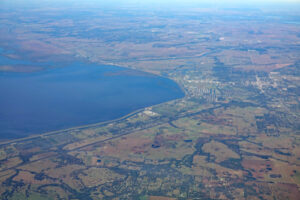
U.S. Rep. Brian Mast (R-FL) on Monday denounced an “eleventh-hour” move by the National Marine Fisheries Service (NMFS) that poses a six-month delay in starting a new Florida water discharge process for Lake Okeechobee that’s slated to go into effect this summer.
The U.S. Army Corps of Engineers currently determines when to discharge water to the east and west of Lake Okeechobee using a document called the Lake Okeechobee Regulation Schedule, which Rep. Mast has called an “outdated and harmful regulation schedule” that seriously damages the community through frequent discharges of toxic water.
The Corps is in the process of revising this schedule, now called the Lake Okeechobee System Operating Manual (LOSOM), and is expected to select a final plan in July.
However, NMFS recently stepped in and ordered a formal biological consultation of the LOSOM’s impact on the ecosystems in Florida’s west coast estuaries, likely delaying implementation of the new schedule by six months or more, according to an April 10 letter Rep. Mast sent to NMFS Assistant Administrator for Fisheries Janet Coit.
“This delay will have an immediate and negative impact on the water quality of the east and west coasts this summer, which are projected to have intense harmful algal blooms due to Hurricanes Nicole and Ian,” Rep. Mast wrote, noting that the NMFS has “sat on its hands for almost four years” without weighing in on the situation until now.
The congressman expressed serious concerns about NMFS’s last-minute order after years of minimal participation in meetings of the Project Delivery Team that was responsible for developing the LOSOM, according to his letter.
“This is a late flag on the play that could cost the Treasure Coast a major win in our push for clean water,” said Rep. Mast in an April 11 statement. “NMFS’s concerns are valid. Since I’ve been sworn into Congress, I’ve been pushing to address the negative impacts disgusting Lake Okeechobee water has on coastal ecosystems. The problem is that NMFS has had literally years to share these concerns, but sat quiet through meeting after meeting of the Project Delivery Team.”
Now, the community faces “another rainy season of toxic crap being sent into our water while they conduct this study,” he said, adding that if NMFS is concerned the discharges are bad for the estuaries, then its goal should be to get LOSOM in place as soon as possible.
“It will be a huge improvement over the status quo,” said the congressman.
In his letter, Rep. Mast requested that Coit detail the NMFS’s timeline for completing its review and provide input on the LOSOM to the Army Corps of Engineers by April 17.
“Instead of waiting until the last minute to register concerns, NMFS should have been engaged throughout the writing of LOSOM,” he wrote. “Now the estuaries will be forced to go through another summer under [the existing 2008 schedule], putting us at risk more often for significant harmful discharges that degrade the delicate estuarine ecosystems.”



